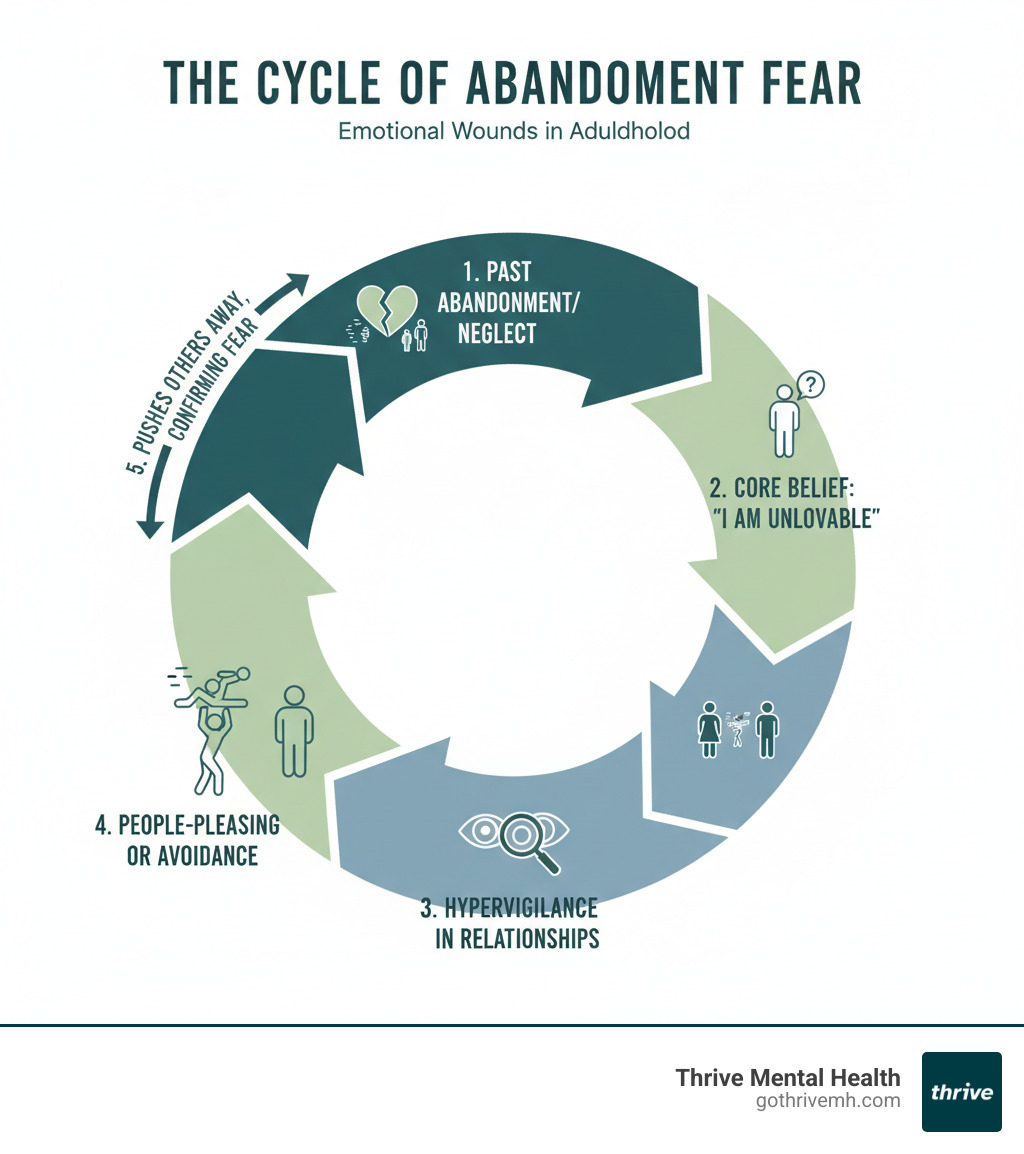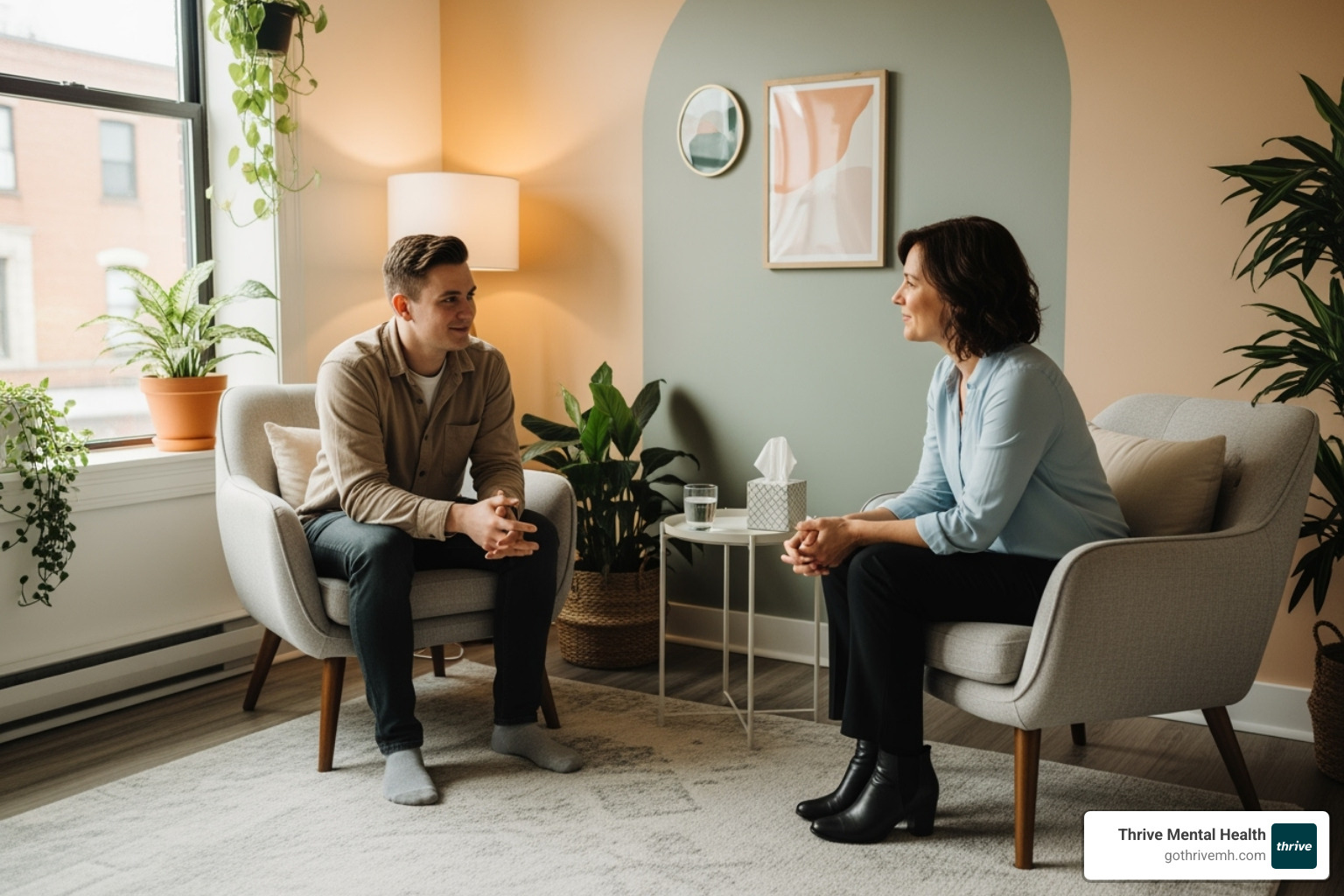7 Ways to Know if You Have Abandonment Issues in Adults

What Are Signs of Abandonment Issues in Adults? 7
Why Do I Feel So Afraid of Being Left?
What Are Signs of Abandonment Issues in Adults? If you’ve ever felt a deep, persistent fear that people you care about will leave you, you’re not alone. Abandonment issues show up in specific, recognizable patterns:
7 Key Signs of Abandonment Issues in Adults:
- Intense fear of rejection leading to people-pleasing
- Difficulty trusting others and hypervigilance in relationships
- Clinginess or codependency with partners or friends
- Avoiding intimacy or pushing people away (self-sabotage)
- Low self-esteem and constant need for validation
- Extreme emotional sensitivity and mood swings
- Cycling through unhealthy relationships or staying in bad ones
These patterns are not a formal diagnosis but emotional wounds from past experiences, like inconsistent care or loss. Recognizing these signs is the first step. While deeply rooted, these fears aren’t permanent, and you can build healthier, more secure relationships.
I’m Anna Green, LMHC, LPC. For over a decade, I’ve helped people heal from abandonment issues using evidence-based therapies like DBT and EMDR. This guide will show you the signs and how to start your healing journey.

Related reading:
What Causes Abandonment Issues? The Link to Trauma and Loss
Abandonment fears are not random; they are rooted in real experiences of loss or emotional distance. These experiences can change your brain and nervous system, putting you on high alert for rejection in relationships.
Childhood Experiences
The roots of abandonment fear are often in childhood. Early relationships with caregivers create a blueprint for what we expect from connection. When those bonds are inconsistent or broken, it leaves a lasting mark.
- Emotional neglect happens when a parent is physically present but emotionally absent—dismissing your feelings or treating you like a peer. You learn your emotional needs don’t matter. A 2022 study found that both emotional abuse and neglect were strongly associated with abandonment issues later in life.
- Physical neglect, such as inconsistent food or shelter, sends a similar message: you can’t rely on others.
- Loss of a caregiver through death or divorce is traumatic, and children often blame themselves. Research shows that children in unstable environments are at higher risk for anxious attachment.
- Inconsistent caregiving, where a parent is warm one day and cold the next, makes love feel conditional. This unpredictability often leads to an anxious attachment style, where you crave closeness but live in fear of rejection.
Adult Trauma
Significant losses in adulthood can also trigger or worsen these fears.
- A painful breakup, especially a sudden one, can leave you with lasting abandonment anxiety.
- Grief from the death of a loved one is a profound trauma. A 2021 meta-analysis links grief to higher anxiety and depression, and those with abandonment fears often experience grief more intensely.
- Betrayal, like infidelity, can spark abandonment issues, as the emotional withdrawal feels as devastating as a physical departure.
The Two Main Types of Abandonment
Abandonment isn’t always about someone walking out the door.
- Physical abandonment is the obvious form: a parent leaves, a partner ends things. The absence is concrete.
- Emotional abandonment is more subtle. The person is physically present but emotionally unavailable. They dismiss your feelings, leaving you feeling unseen, lonely, and worthless.
How Childhood Experiences Shape Adult Relationships
Early relationships become a template for adult connections, a concept known as attachment theory. Consistent, responsive care leads to secure attachment, where you learn people are trustworthy and you are worthy of love. Inconsistent or absent care leads to insecure attachment, where your nervous system gets wired for threat, constantly scanning for rejection.
The good news is that these patterns can change. Understanding your past is the first step. If you’re ready for professional support, learn more about our virtual therapy programs available to Florida residents, designed to heal attachment wounds and build secure relationships.
What Are the Signs of Abandonment Issues in Adults? [LIST] of 7 Key Indicators
Recognizing the signs of abandonment issues is key to understanding their impact on your life. These aren’t occasional worries; they are intense, persistent patterns of thought and behavior that can disrupt your relationships and well-being.
1. An Intense Fear of Rejection That Leads to People-Pleasing
If the thought of disapproval is terrifying, you might be a people-pleaser. This is a defense mechanism to prevent abandonment by becoming indispensable and agreeable.
- People-pleasing behaviors: Going to extreme lengths to make others happy, often at your own expense.
- Avoiding conflict: Shying away from disagreements for fear that friction will lead to someone leaving.
- Difficulty saying no: Agreeing to things you don’t want to do to avoid disappointing others.
- Suppressing your own needs: Neglecting your feelings and boundaries to accommodate others.
2. Difficulty Trusting Others and Hypervigilance in Relationships
Past hurts make it hard to trust. You may feel unsafe even in secure relationships, constantly scanning for signs of betrayal. This hypervigilance is exhausting and can ironically push people away.
- Suspiciousness: Constantly questioning a partner’s intentions or loyalty.
- Overanalyzing interactions: Scrutinizing every text, glance, or comment for hidden negative meanings.
- Looking for signs of leaving: A delayed text or canceled plan triggers intense anxiety.
- Testing a partner’s loyalty: Unconsciously putting your partner through “tests” to see if they will abandon you.

3. A Tendency Towards Clinginess or Codependency
The fear of being alone can lead to an over-reliance on relationships. This manifests as a strong need for constant reassurance and validation from a partner.
- Needing constant reassurance about your partner’s love.
- Distress at the thought of being alone.
- Relying on your partner for your emotional well-being and identity.
- Losing your own hobbies and friends in a relationship.
- Struggling when your partner needs personal space.
4. Avoiding Intimacy and Pushing People Away (Self-Sabotage)
Paradoxically, the fear of being left can cause you to push people away. If getting close means risking pain, it can feel safer to keep everyone at a distance. This is a powerful form of self-sabotage.
- Struggling with emotional vulnerability.
- Ending relationships as they become more intimate.
- Unconsciously choosing emotionally unavailable partners.
- Feeling emotionally numb to avoid pain.
- Intentionally creating distance or starting fights.
5. Low Self-Esteem and a Constant Need for External Validation
Abandonment can erode self-worth, leading to the core belief that you were left because you are flawed or unlovable. This creates a vicious cycle of seeking external approval.
- Pervasive feelings of worthlessness.
- Automatically blaming yourself when things go wrong.
- A core belief that you are unlovable.
- Extreme sensitivity to criticism.
- Feeling incomplete or valueless when single.
6. Extreme Emotional Sensitivity and Mood Swings
Emotions are often experienced with great intensity. Minor issues can feel like major threats, triggering powerful reactions like anxiety, anger, or sadness.
- Dramatic mood swings based on relationship stability.
- Overreacting to perceived slights or disagreements.
- Constant underlying anxiety about your relationships.
- Intense jealousy and possessiveness.
- Difficulty regulating emotions, as research shows is common with attachment anxiety.
7. Cycling Through Unhealthy or Unstable Relationships
A painful sign is repeating unhealthy relationship patterns. You might be drawn to dynamics that feel familiar, even if they are destructive, or struggle to leave a bad situation for fear of being alone.
- Attracting partners who are unavailable or inconsistent.
- Being drawn to chaotic or dramatic relationships.
- Staying in unhappy relationships to avoid loneliness.
- Jumping from one relationship to the next with no time to heal.
How Fear of Abandonment Impacts Your Life
Abandonment fears don’t just affect romance; they impact all relationships, your career, and your mental health. This underlying anxiety shapes how you see yourself and the world.
What are the signs of abandonment issues in adults and their link to attachment styles?
Abandonment issues are deeply tied to the insecure attachment styles we develop in childhood. These emotional blueprints dictate how we approach intimacy and independence. Clinically, abandonment issues are most often linked with an insecure attachment style, which can be anxious, avoidant, or disorganized.
| Attachment Style | Core Fear Related to Abandonment | Typical Behaviors in Relationships |
|---|---|---|
| Secure | Minimal fear of abandonment | Comfortable with intimacy and independence, trusts others, communicates needs clearly, manages conflict constructively. |
| Anxious | Intense fear of abandonment, rejection, being unloved. | Craves extreme closeness, worries about partner’s love, seeks constant reassurance, can be clingy or possessive, emotionally reactive. |
| Avoidant | Fear of intimacy, losing independence, being controlled, or being hurt if they get too close. | Appears distant or withdrawn, struggles with emotional expression, values independence highly, avoids deep emotional connection, may push partners away. |
| Disorganized | Fear of both intimacy and abandonment, internal conflict. | Inconsistent and unpredictable behavior, desires closeness but also fears it, struggles to regulate emotions, may have experienced trauma. |
What are the signs of abandonment issues in adults and their effect on mental health?
The constant emotional turmoil takes a significant toll. Living in a state of fear is exhausting and is linked to a higher risk of developing other mental health conditions.
- Anxiety Disorders: Chronic worry and hypervigilance can lead to generalized anxiety, panic attacks, or social anxiety.
- Depression: Feelings of worthlessness, loneliness, and the pain of unstable relationships can result in clinical depression.
- Low Self-Worth: A core belief of being unlovable impacts confidence in all areas of life.
- Links to BPD: A profound fear of abandonment is a core symptom of Borderline Personality Disorder (BPD), which involves intense emotional reactions and unstable relationships.
- Chronic Loneliness: Ironically, behaviors meant to prevent abandonment often lead to isolation.
- Unhealthy Coping Mechanisms: Some turn to substance use, eating disorders, or self-harm to numb the pain, which ultimately creates more problems. Our mental health blogs offer resources for these challenges.
Healing is Possible: How to Cope With and Treat Abandonment Issues
If you recognize these signs in yourself, know that healing is absolutely possible. These fears are learned responses to pain, and they can be unlearned. With the right support, you can build the secure, healthy connections you deserve.

Actionable Coping Strategies You Can Start Today
You can start managing these fears today with these powerful strategies.
- Practice Self-Compassion: Your fears are a protective mechanism. Talk to yourself kindly, as you would a friend.
- Acknowledge Your Feelings: Instead of judging your fear, simply notice it. Naming an emotion can reduce its power.
- Identify Your Triggers: Note what situations activate your fears (e.g., a canceled plan, feeling distant from a partner). Awareness helps you prepare.
- Use Grounding Techniques: When you feel a spiral of anxiety, bring yourself to the present moment. Name five things you see, four you can touch, three you can hear.
- Set Healthy Boundaries: Boundaries create safety and show you’re worthy of respect. Forming healthy boundaries is a key skill.
- Communicate Your Needs: Practice expressing your needs calmly and directly, rather than expecting others to guess.
- Prioritize Self-Care: Nourish yourself with enough sleep, good food, and activities you enjoy. Meeting your own needs reduces dependency on others.
Professional Treatment Options for Lasting Change
While self-help is a great start, professional therapy offers a safe space to explore the roots of your fears and develop healthier relationship patterns.
- Cognitive Behavioral Therapy (CBT): Helps you identify and challenge the negative thought patterns that fuel your fears. Studies show that CBT can be an effective tool to help repair attachment injuries.
- Dialectical Behavior Therapy (DBT): Teaches concrete skills for managing intense emotions, tolerating distress, and navigating interpersonal conflicts. It’s especially helpful for relationship instability.
- Psychodynamic Therapy: Explores how past relationships continue to shape your present, giving you insight to make different choices.
For more intensive support, Intensive Outpatient Programs (IOP) and Partial Hospitalization Programs (PHP) offer structured treatment while you maintain daily responsibilities. At Thrive Mental Health, we offer virtual and in-person IOP/PHP programs for adults. Our expert-led care is custom to you, with flexible scheduling. You can learn more info about our IOP/PHP programs.
We know cost is a concern and many insurance providers cover our services, including Cigna, Optum, and Florida Blue. We serve clients throughout Florida, making quality care accessible to residents across the state. The path to healing isn’t always linear, but with commitment and support, you can build the secure, fulfilling life you want.
Frequently Asked Questions about Abandonment Issues
Here are answers to some of the most common questions about what are signs of abandonment issues in adults.
What is the difference between abandonment issues and attachment issues?
Abandonment issues are a specific, intense fear that people will leave you. Attachment issues are a broader term for difficulty in forming emotional connections. Your fear of abandonment is often the driving force behind an insecure attachment style (anxious or avoidant).
Can you develop abandonment issues as an adult without childhood trauma?
Yes. While often rooted in childhood, significant adult trauma can create these fears. A sudden death of a partner, a devastating divorce, or a profound betrayal can rewire your nervous system to fear being left again, even if your childhood was secure.
What type of therapy is best for abandonment issues?
There’s no single “best” therapy, as treatment should be personalized. However, several approaches are highly effective:
- Dialectical Behavior Therapy (DBT) teaches skills to manage intense emotions and improve relationships.
- Cognitive Behavioral Therapy (CBT) helps you challenge and change the negative thoughts that fuel your fear.
- Psychodynamic Therapy explores the past to understand the origins of your fears.
At Thrive Mental Health, our virtual therapy programs for Florida residents use these evidence-based approaches, including intensive IOP and PHP options. A therapist will help find the best fit for you.
Take the First Step Toward Secure Relationships
Recognizing what are signs of abandonment issues in adults is the first step toward healing and building the secure, healthy relationships you deserve. These patterns are deeply ingrained, but with self-awareness and support, you can change them. Thrive Mental Health provides expert-led, evidence-based care to help you understand your past and build a more confident future.
Ready for support? Thrive offers virtual and hybrid IOP/PHP with evening options. Verify your insurance in 2 minutes (no obligation) → Start benefits check or call 561-203-6085. If you’re in crisis, call/text 988.
